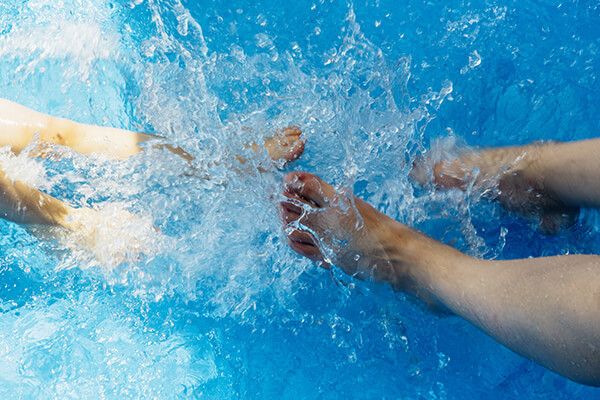Your hearing aids got wet?
If you’re like most of our patients we talk to about this common issue for individuals with hearing loss, the first thing that comes to mind when hearing aids get wet is panic.
Summer is finally here and with it comes humidity and sweaty outdoor activities that can cause your hearing aids to ‘be on the fritz’!
Like any electronic device, high humidity and the summer heat can cause moisture to build up over time in your hearing aids with moisture in them can cause corroded components, damaged microphone and receivers and can even affect battery drain.
We all love those summer BBQs, sitting poolside, gardening, golfing or playing a round of cornhole with friends, but those sweaty days can damage your hearing aids, interfere with function and decrease your battery life.
If you’re like most people, the first thing that comes to mind when your rechargeable hearing aids got wet is panic.
But if your hearing aids have gotten wet from sweat or rain, they are probably still in working condition. In fact, according to research by Starkey Hearing Technologies, only 5% of all hearing devices that get wet actually need replacing if you follow these important steps that we will share with you right away.
The rest are fine once dried out properly!
Fortunately, most hearing aids today are designed to be water-resistant and offer moisture protection. If you realize there has been a build-up of moisture or sweat over time or you accidentally cannonball into the swimming pool, here are a few steps you can take to make sure your hearing aids are in good shape after they have gotten wet outside the house:
Turn off Your Hearing Aids.
If your hearing aid gets wet, turn it off and open the battery compartment. Remove any excess water that is visible so you can allow the hearing aid to dry.
Open the Battery Doors and Remove the wet battery (if you don’t have rechargeable batteries).
Put a fresh battery in the battery compartment just to be on the safe side, but not until you are sure that everything is completely dry, and you have followed the other steps in this article.
You’ll also want to remove any earmolds from the wet hearing aids if you have them so that they can dry out as well.
Gently Dry Your Hearing Aids Using a Towel.
Gently dry your hearing aids using a towel or dry cloth. Do not use an excessive heat source such as microwaves, hair dryers, stoves etc., because these could damage electronics within the device which could lead to permanent loss of functionality and/or injury due to overheating.
Put Your Hearing Aids in a Dehumidifier or Drying Box.
Dehumidifiers or a hearing aid dryer can work magic by evaporating moisture and hopefully jump starting your hearing aids again.
If you don’t have a dehumidifier, you can also place the hearing aids in a bowl of uncooked rice overnight or leave them sitting on top of newspaper for at least 24 hours before turning it back on. As crazy as it may sound- it can work!
Don’t use alcohol or other chemicals to clean or repair them because this could damage the electronic components inside and cause permanent damage to your device!
You can also leave them open on a countertop until completely dry (usually takes about 24 hours). Make sure not to put anything else on top of them while they are drying!
If possible, place near an air vent so they can continue drying more quickly without being disturbed by pets or children who might knock them around, as well as other household items such as furniture which may cause damage during this process.
If you do not have a special hearing aid dryer, this is something we can provide for you at Centers for Hearing Care.
Schedule an Appointment for a More Thorough Exam of your Hearing Aids
You should always follow up with your hearing care professional to have a thorough exam of your hearing aids to make sure there’s no corrosion build up or water damage that may not be noticed.
If you have a hearing aid that has been submerged in water, please contact your hearing healthcare professional at Centers for Hearing Care for additional tips on how to help get it functioning properly again, or what your recommended next steps should be.
Donna Yake, is a hearing instrument specialist who practices at Center For Hearing Care

